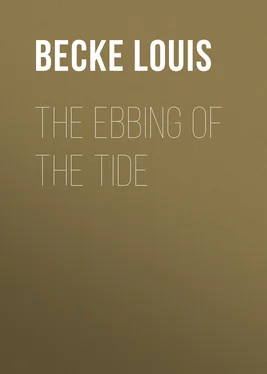Louis Becke - The Ebbing Of The Tide
Здесь есть возможность читать онлайн «Louis Becke - The Ebbing Of The Tide» — ознакомительный отрывок электронной книги совершенно бесплатно, а после прочтения отрывка купить полную версию. В некоторых случаях можно слушать аудио, скачать через торрент в формате fb2 и присутствует краткое содержание. Жанр: foreign_prose, literature_19, foreign_antique, на английском языке. Описание произведения, (предисловие) а так же отзывы посетителей доступны на портале библиотеки ЛибКат.
- Название:The Ebbing Of The Tide
- Автор:
- Жанр:
- Год:неизвестен
- ISBN:нет данных
- Рейтинг книги:5 / 5. Голосов: 1
-
Избранное:Добавить в избранное
- Отзывы:
-
Ваша оценка:
- 100
- 1
- 2
- 3
- 4
- 5
The Ebbing Of The Tide: краткое содержание, описание и аннотация
Предлагаем к чтению аннотацию, описание, краткое содержание или предисловие (зависит от того, что написал сам автор книги «The Ebbing Of The Tide»). Если вы не нашли необходимую информацию о книге — напишите в комментариях, мы постараемся отыскать её.
The Ebbing Of The Tide — читать онлайн ознакомительный отрывок
Ниже представлен текст книги, разбитый по страницам. Система сохранения места последней прочитанной страницы, позволяет с удобством читать онлайн бесплатно книгу «The Ebbing Of The Tide», без необходимости каждый раз заново искать на чём Вы остановились. Поставьте закладку, и сможете в любой момент перейти на страницу, на которой закончили чтение.
Интервал:
Закладка:
She thrust her hands in among them and threw handsful after handsful into the canoe, and then her dreadful thirst and hunger made her cease, and, taking fish after fish, she bit into them with her sharp teeth, and assuaged both hunger and thirst.
As she tore ravenously at the atuli the sky became overcast, and while the bonitas splashed and jumped around her, and the birds cried shrilly overhead, the blessed rain began to fall, at first in heavy drops, and then in a steady downpour.
Taking off her thick grass girdle, she rolled it up into a tight coil and placed it across the bottom of the canoe, about two feet from the bows, so as to form a dam; and then, lying face downwards, she drank and drank till satisfied. Then she counted the atuli . There were over forty.
All that day the rain squalls continued, and then the wind settled and blew steadily from the east, and Ninia kept the canoe right before it.
That night she slept but little. A wild hope had sprung up in her heart that she might reach the island of Ponape, which she knew was not many days’ sail from Pingelap. Indeed, she had once heard her father and Sralik talking about going there in the whaleboat to sell turtle-shell to the white traders there.
But she did not know that the current and trade wind were setting the canoe quickly away from Ponape towards a group of low-lying atolls called Ngatik.
The rain had ceased, and in the warm, starlight night she drifted on to the west, and as she drifted she dreamed of her father, and saw Ninia the widow, her mother, sitting in the desolate house on Takai, before the dying embers of the fire, and heard her voice crying:
“ O thou white Christ God, to whom my husband called as he died, tell me are my children perished? I pray thee because of the white blood that is in them to protect them and let me behold my beloved again .”
The girl awoke. Her mother’s voice seemed to still murmur in her ears, and a calm feeling of rest entered her soul. She took her paddle, and then stopped and thought.
This new God—the Christ-God of her father—perhaps He would help her to reach the land. She, too, would call upon Him, even as her mother had done.
“See, O Christ-God. I am but one left of three. I pray Thee guide my canoe to land, so that I may yet see Ninia my mother once more.”
As the dawn approached she dozed again, and then she heard a sound that made her heart leap—it was the low, monotonous beat of the surf.
When the sun rose she saw before her a long line of low-lying islands, clothed in cocoanuts, and shining like jewels upon the deep ocean blue.
She ate some more of the fish, and, paddling as strongly as her strength would permit, she passed between the passage, entered the smooth waters of the lagoon, and ran the canoe up on to a white beach.
“The Christ-God has heard me,” she said as she threw her wearied form under the shade of the cocoa-nut palms and fell into a heavy, dreamless slumber.
And here next morning the people of Ngatik found her. They took the poor wanderer back with them to their houses that were clustered under the palm-groves a mile or two away, and there for two years she dwelt with them, hoping and waiting to return to Pingelap.
One day a ship came—a whaler cruising back to Strong’s Island and the Marshall Group. The captain was told her story by the people of Ngatik, and offered to touch at Pingelap and land her.
Ninia the widow was still living on Takai, and her once beautiful face had grown old and haggard-looking. Since the night of the storm four ships had called at Pingelap, but she had never once gone over to the village, for grief was eating her heart away; and so, when one evening she heard that a ship was in sight, she took no heed.
Her house was very sad and lonely now, and as night came on she lay down in her end of the house and slept, while the other four people sat round the fire and talked and smoked.
In the middle of the night the four slaves got up and went away to the village, for they wanted to be there when the boat from the ship came ashore.
At daylight the ship was close in, and the people in the village saw a boat lowered. Then a cry of astonishment burst from them when they saw the boat pull straight in over the reef and land at Takai, about a hundred yards from the house of Ninia, the white man’s widow.
Only one person got out, and then the boat pushed off again and pulled back to the ship.
Ninia the widow had risen, and was rolling up the mat she had slept upon, when a figure darkened the doorway. She turned wonderingly to see who it was that had come over so early from the village, when the stranger, who was a tall, graceful young girl, sprang forward, and, folding her arms around her, said, sobbing with joy—
“My mother… The Christ-God hath brought me back to thee again.”
BALDWIN’S LOISÈ—Miss Lambert
Her mother was a full-blooded native—a woman of Anaa, in the Chain Islands—her father a dissolute and broken white wanderer. At the age of ten she was adopted by a wealthy South Sea trading captain, living on the East Coast of New Zealand. He, with his childless wife, educated, cared for, and finally loved her, as they once loved a child of their own, dead twenty years before.
At sixteen Loisé was a woman; and in the time that had passed since the morning she had seen her reckless, beach-combing father carried ashore at Nukutavake with a skinful of whisky and his pockets full of the dollars for which he had sold her, the tongue and memories of her mother’s race had become, seemingly, utterly forgotten.
But only seemingly; for sometimes in the cold winter months, when savage southerly gales swept over the cloud-blackened ocean from the white fields of Antarctic ice and smote the New Zealand coast with chilling blast, the girl would crouch beside the fire in Mrs. Lambert’s drawing-room, and covering herself with warm rugs, stare into the glowing coals until she fell asleep.
She had not forgotten.
One day a visitor came to see her adopted father. He was captain of a small trading schooner running to the Paumotus—her mother’s land—and although old Lambert had long since given up his trading business and voyagings, he liked to meet people from the Islands, and, indeed, kept open house to them; so both he and Mrs. Lambert made him welcome.
The captain of the schooner was a man of a type common enough in the South Seas, rough, good-humoured, and coarsely handsome.
After dinner the two men sat over their whisky and talked and smoked. Mrs. Lambert, always an invalid, had gone to her room, but Loisé, book in hand, lay on a sofa and seemed to read. But she did not read, she listened. She had caught a word or two uttered by the dark-faced, black-bearded skipper—words that filled her with vague memories of long ago. And soon she heard names—names of men, white and brown, whom she had known in that distant, almost forgotten and savage childhood.
When the seaman rose to leave and extended his tanned, sinewy hand to the beautiful “Miss Lambert,” and gazed with undisguised admiration into her face, he little thought that she longed to say, “Stay and let me hear more.” But she was conventional enough to know better than that, and that her adopted parents would be genuinely shocked to see her anything more than distantly friendly with such a man as a common trading captain—even though that man had once been one of Lambert’s most trusted men. Still, as she raised her eyes to his, she murmured softly, “We will be glad to see you again, Captain Lemaire.” And the dark-faced seaman gave her a subtle, answering glance.
All that night she lay awake—awake to the child memories of the life that until now had slumbered within her. From her opened bedroom window she could see the dulled blaze of the city’s lights, and hear ever and anon the hoarse and warning roar of a steamer’s whistle. She raised herself and looked out upon the waters of the harbour. A huge, black mass was moving slowly seaward, showing only her masthead and side-lights—some ocean tramp bound northward. Again the boom of the whistle sounded, and then, by the quickened thumping of the propeller, the girl, knew that the tramp had rounded the point and was heading for the open sea.
Читать дальшеИнтервал:
Закладка:
Похожие книги на «The Ebbing Of The Tide»
Представляем Вашему вниманию похожие книги на «The Ebbing Of The Tide» списком для выбора. Мы отобрали схожую по названию и смыслу литературу в надежде предоставить читателям больше вариантов отыскать новые, интересные, ещё непрочитанные произведения.
Обсуждение, отзывы о книге «The Ebbing Of The Tide» и просто собственные мнения читателей. Оставьте ваши комментарии, напишите, что Вы думаете о произведении, его смысле или главных героях. Укажите что конкретно понравилось, а что нет, и почему Вы так считаете.












